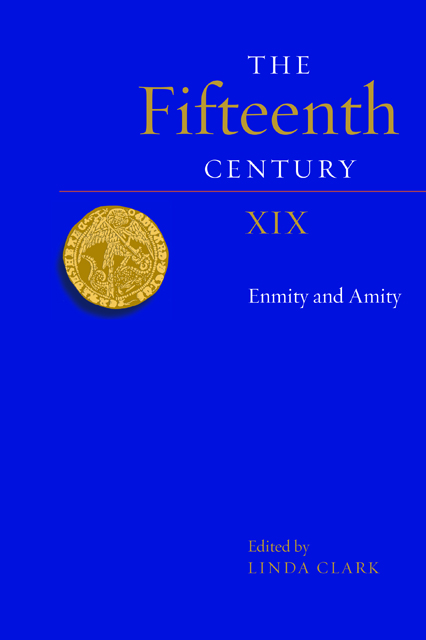Book contents
- Frontmatter
- Contents
- List of Contributors
- Preface
- List of Abbreviations
- England and Europe, c.1450–1520: Nostalgia or New Opportunities?
- Mariners and Marauders: A Case Study of Fowey during the Hundred Years’ War, c.1400–c.1453
- Henry V’s Army of 1417
- ‘Get out of our land, Englishmen’. French Reactions to the English Invasion of 1512–13
- Encountering the ‘Duche’ in Margery Kempe’s Lynn
- ‘C’est le Beaulté de Castille et d’Espaigne, qui le Soleil cler d’Austrice accompaigne’: Jean Molinet makes the Habsburgs Burgundian
- Magna Carta in the Late Middle Ages, c.1320–c.1520
- The Business of the Southern Convocation in 1462
- Index
- Contents of Previous Volumes
England and Europe, c.1450–1520: Nostalgia or New Opportunities?
Published online by Cambridge University Press: 20 December 2022
- Frontmatter
- Contents
- List of Contributors
- Preface
- List of Abbreviations
- England and Europe, c.1450–1520: Nostalgia or New Opportunities?
- Mariners and Marauders: A Case Study of Fowey during the Hundred Years’ War, c.1400–c.1453
- Henry V’s Army of 1417
- ‘Get out of our land, Englishmen’. French Reactions to the English Invasion of 1512–13
- Encountering the ‘Duche’ in Margery Kempe’s Lynn
- ‘C’est le Beaulté de Castille et d’Espaigne, qui le Soleil cler d’Austrice accompaigne’: Jean Molinet makes the Habsburgs Burgundian
- Magna Carta in the Late Middle Ages, c.1320–c.1520
- The Business of the Southern Convocation in 1462
- Index
- Contents of Previous Volumes
Summary
As an undergraduate in the Oxford of the 1960s, I heard a series of lectures on Lancastrian kingship given in Magdalen College Hall by K.B. McFarlane, Fellow of that College. Apart from the sticky surface of the Hall tables, recently subject to spills of breakfast marmalade, the lectures were memorable for many things, not least for the lapidary prose in which they were delivered. McFarlane’s lecture on Henry V began as follows (his audience tried to take more or less verbatim notes, suspecting that what he said would be unlikely to be seen in print before they took Finals – or perhaps never): ‘If there were a great medieval English king, then Harry of Monmouth was he’.
McFarlane then, by contrast, went on in a later lecture to deliver his verdict on Henry VI whose ‘head was too small for his father’s crown’ and to lament the consequences, as he saw them, of Henry V’s premature death in late August 1422. He was to some extent simply sharing and echoing the views of many fifteenth-century English people. England, they considered, had experienced its days of glory but they were no more. Their radiance cast a long shadow, a shadow that fell especially on English attitudes and behaviour towards continental Europe for at least the following century. But there were other tendencies at work, of both a warlike and more pacific nature, which were to determine England’s relations with its continental neighbours over that period. So this contribution to the present volume falls into two (hopefully not unrelated) parts. First, I would like to look at the extent to which what we might call political and military nostalgia informed the thoughts and assumptions of the English between the debacles in France of the 1450s and the changed conditions of the 1520s. Secondly, I will try to offset that apparently retrospective and possibly regressive approach with evidence for innovations or new directions in England’s external relations. Clearly political and diplomatic conditions did – in many but not all areas – change radically between the mid-fifteenth and the end of the first quarter of the sixteenth centuries. How England adapted and adjusted to those conditions will, I suggest, necessarily take us to some extent outside the kind of Anglo-Franco-Netherlandish perspective in which England’s relations with its continental counterparts at this time has traditionally been viewed.
- Type
- Chapter
- Information
- The Fifteenth Century XIXEnmity and Amity, pp. 1 - 15Publisher: Boydell & BrewerPrint publication year: 2022

